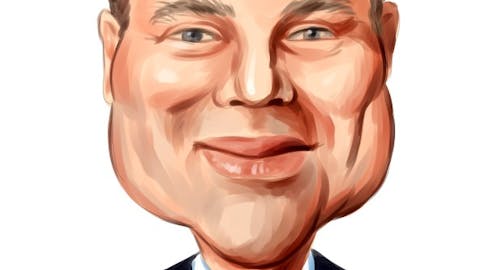Editor’s Note: Sony Corporation (ADR) (NYSE:SNE)

Last week George Clooney, the Oscar-winning mega star, slammed Third Point Capital CEO Dan Loeb over the hedge fund manager’s recent critical remarks about Sony Corporation (ADR) (NYSE:SNE) Entertainment’s performance. So how did the notoriously sharp-tongued investor strike back? Not with a bang but a whimper. From an interview with Variety: “Notwithstanding the fact that the media likes to create a stir, I admire Mr. Clooney’s passion for Sony Corporation (ADR) (NYSE:SNE) and his loyalty to Sony and his friends there,” said Loeb, suggesting that he and Clooney share a “common goal” in that “a more disciplined company with better allocation of capital means less money spent on bureaucracy and more investment in motion pictures. We are all for intelligent investment in creative content. I believe our interests are aligned in a way he probably doesn’t realize.”
Hedge Funds Led by Paulson Gain as Equities Rebound on Bernanke (Businessweek)
Hedge funds returned an average 0.6 percent in July as global stocks rallied following assurances from Federal Reserve Chairman Ben Bernanke that the central bank won’t withdraw its monetary stimulus prematurely. Billionaire John Paulson posted gains in all four of his hedge-fund firm’s main strategies in July as his Recovery fund recouped losses incurred in 2011, a person familiar with the matter said. Hedge funds overall trailed global stocks, which rose 4.7 percent last month after Bernanke said that it’s too early to decide whether to begin scaling back debt purchases in September, after surprising markets in June by saying that bond buying could slow if the economy improves.
Winton escalates computer-driven hedge fund arms race (Reuters)
Winton Capital, one of the world’s biggest hedge fund firms, has developed a new model of its flagship fund, hoping its greater allocation to equities and risk will produce better returns in a sector struggling to make money. The move by Winton – a computer-driven trader set up in 1997 by multi-millionaire David Harding, the co-founder of Man Group’s (EMG.L) flagship AHL fund – could affect tens of billions of dollars held by pension funds and other investors in its main Futures fund. Winton has quietly overhauled its $40 million Evolution fund, which was previously focused on its best trading ideas, but had a mixed record – making money in 2010 and 2011 and losing money last year.
WHO’S AFRAID OF HEDGE-FUND ADVERTISING? (New Yorker)
In April, 2012, President Barack Obama signed into law the Jumpstart Our Business Startups (JOBS) Act, which makes it far easier for companies to market their securities to investors. Next month, rules mandated by the JOBS Act and adopted in July by the Securities and Exchange Commission will go into effect that loosen the decades-old prohibitions on general solicitation efforts such as cold calling, mass mailing, and running certain commercials. Will we soon see full-page advertisements for hedge funds in the Times, GQ, or Sports Illustrated? Maybe there will be smiling children and a line like “Invest in Cerberus: Your Future and Your Family.” Will they run commercials during the Super Bowl or the Sunday-morning talk shows? What about mass mailings to everyone in the tri-state area who bought a Mercedes-Benz or a Rolex last year? It’s all possible now.
Case Against SAC Capital Opens New Questions (Forbes)
By indicting SAC Capital for insider trading last month, the government finally brought to a close a question that has been hanging over the hedge fund – and Wall Street in general – over the past few months: would Steve Cohen or his hedge fund face criminal charges. Now that the case against the fund (but not Cohen, who has maintained his innocence) has been filed by the U.S. Attorney’s Office, a new series of questions has emerged that will have an impact far beyond the lawsuit.
1. Why didn’t SAC Capital’s settlement with the Securities and Exchange Commission prevent this indictment?
2. Will SAC Capital survive?
3. Will the tippers who allegedly provided SAC Capital employees with inside information be prosecuted?
Magnetar Won’t Be Charged In CDO Case (FINalternatives)
Hedge fund Magnetar Capital appears poised to avoid allegations of wrongdoing over a controversial collateralized debt obligation. The Securities and Exchange Commission is preparing to charge Bank of America’s Merrill Lynch over its role in creating the $1.5 billion Norma CDO I. But the regulator will not charge Magnetar, The Wall Street Journal reports. The decision makes it likely that no hedge fund will face a civil enforcement action over CDOs created prior to the financial crisis. While the SEC plans to take action on Norma and at least one other CDO, the agency plans to wrap up the matters this year.
European Hedge Funds Pay Out Big Bonuses (Wall Street Journal)
While bankers continue to see their once bounteous pay packets slowly trimmed by incoming regulation and public scrutiny, a number of hedge-fund managers continue to enjoy healthy stipends. Annual profits at the European arm of Tudor Investment Corp., the U.S. macro hedge fund founded by Paul Tudor Jones, grew to $70 million in the 12 months to March 31, 2013, according to company filings this week. That compares with $66 million the previous year. Revenues increased to $120.6 million, up 11.7% from $108 million the previous year. The 21 members of the firm shared $69.6 million in the financial year ended March 31, 2013, up from $67.3 million the previous year. The highest-paid member received $27.6 million, up from $23.3 million.
Hedge Fund Glenview Turns Down HMA’s “Hybrid Board” Proposal (Becker’s Hospital Review)
Yesterday, Naples, Fla.-based Health Management Associates said it would approach its largest shareholder, New York City-based hedge fund Glenview Capital Management, to add Glenview’s nominees to the board of directors. However, Glenview declined the sitting board’s proposal, saying it wanted all shareholders to determine board composition. Over the past several weeks, Glenview has made a concerted effort to replace the entire board of Health Management with eight nominees of its own. Glenview executives have said the current for-profit hospital board has been “substandard,” has led to financial and legal issues and generally has “misaligned” priorities with those of shareholders.



